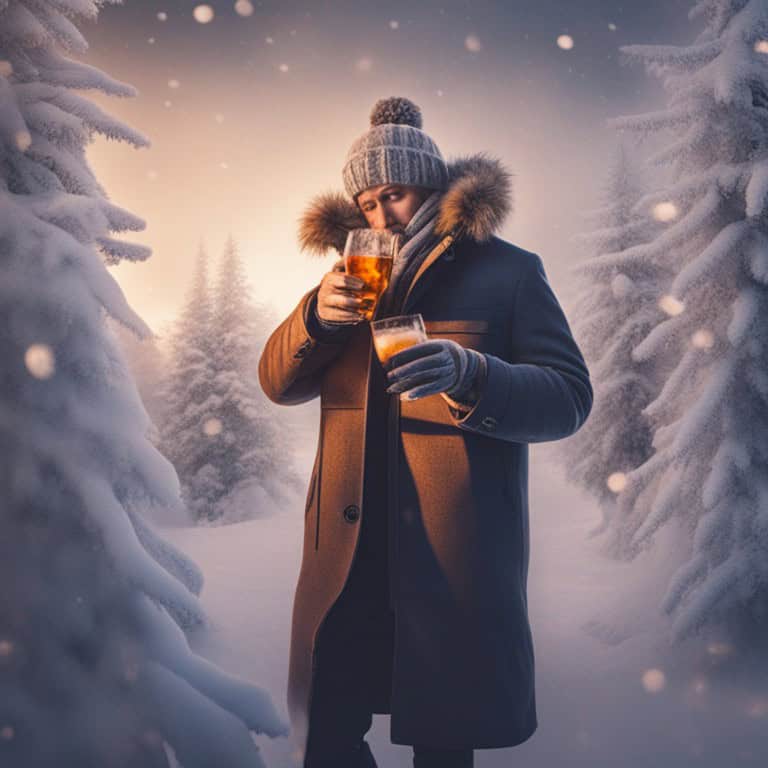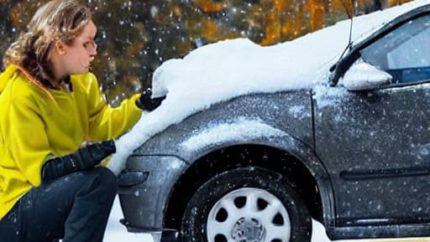Understanding the Risks of Alcohol Consumption in Frigid Temperatures
When facing the challenges of surviving winter in extremely cold conditions, our instinct often drives us to seek warmth and comfort. While it may be tempting to reach for a bottle of alcohol as a quick solution to stave off the chill, it’s crucial to recognize the significant risks that accompany this choice. In this article, we will delve into the dangers of consuming alcohol in frigid environments, highlighting why this practice is not only unsafe but also ineffective for maintaining body warmth. Awareness of these risks can help individuals make informed decisions that prioritize their safety and well-being during harsh winter conditions.
Before we explore the associated dangers, it’s vital to examine the root of the misconception regarding alcohol as a warming agent. The consumption of alcohol leads to the dilation of blood vessels near the skin’s surface, creating a temporary sensation of heat. This feeling can be misleading; while it may seem like a cozy solution, it fails to address the critical need for the body to maintain a stable internal temperature. In fact, the effects of alcohol can be detrimental, impairing our ability to survive in cold weather and potentially increasing the risk of hypothermia and other serious health issues.
 One of the most critical dangers of consuming alcohol in cold settings is the heightened risk of dehydration. Alcohol acts as a diuretic, prompting an increase in urine production, which can lead to significant fluid loss. Additionally, cold air is often drier, and our bodies naturally lose moisture in these conditions, exacerbating dehydration. When combined with the dehydrating effects of alcohol, this situation can severely compromise your body’s hydration levels, which are essential for survival. Dehydration not only impacts physical performance but also impairs cognitive functions, making it harder to think clearly and make rational decisions in life-threatening situations.
One of the most critical dangers of consuming alcohol in cold settings is the heightened risk of dehydration. Alcohol acts as a diuretic, prompting an increase in urine production, which can lead to significant fluid loss. Additionally, cold air is often drier, and our bodies naturally lose moisture in these conditions, exacerbating dehydration. When combined with the dehydrating effects of alcohol, this situation can severely compromise your body’s hydration levels, which are essential for survival. Dehydration not only impacts physical performance but also impairs cognitive functions, making it harder to think clearly and make rational decisions in life-threatening situations.
How Alcohol Impairs Decision-Making and Awareness in Cold Weather
Another alarming effect of alcohol consumption is its capacity to diminish cognitive function and impair judgment. In survival scenarios, the ability to make clear and sensible decisions is paramount. Alcohol consumption can cloud our reasoning, making it difficult to respond effectively to potential dangers. This impaired judgment increases the risk of accidents and poor choices, which can be catastrophic in extreme cold. Remaining vigilant and aware of our surroundings is crucial; alcohol undermines this necessity, leading to a higher likelihood of missteps that could jeopardize safety.
Moreover, alcohol can significantly hinder the body’s ability to maintain proper temperature regulation. When consumed, alcohol causes blood vessels in the skin to expand, facilitating greater heat loss from the body. Initially, this may provide a fleeting sense of warmth, but over time, it accelerates the loss of core body heat, which is essential for survival. This creates a vicious cycle where the initial warmth leads to a rapid drop in core temperature, increasing the risk of severe conditions such as hypothermia. It is essential to understand that while alcohol may seem to provide a temporary solution to cold, it ultimately puts individuals at greater risk.
Understanding Hypothermia Risk and Alcohol Consumption
When discussing the risk of hypothermia, it is crucial to acknowledge how alcohol can mask the early warning signs of this life-threatening condition. Hypothermia occurs when the body’s core temperature falls below the normal range, typically below 95 degrees Fahrenheit (35 degrees Celsius). Common symptoms include shivering, confusion, fatigue, and a lack of coordination. However, alcohol suppresses our body’s natural response mechanisms, making it more challenging to notice these critical signs. By the time hypothermia symptoms become pronounced, it may already be too late to prevent severe harm or even fatal outcomes.
In winter survival situations, there are safer and more effective alternatives to alcohol for maintaining body warmth. Here are several strategies that can help you stay warm and safe:
1. Dress in Layers for Optimal Warmth: Wearing multiple layers of clothing is essential for trapping warm air. Start with thermal base layers, add insulating mid-layers, and finish with a windproof and waterproof outer layer to create a protective barrier against the cold.
2. Keep Your Clothing and Footwear Dry: Moisture can rapidly lead to heat loss, so it’s vital to ensure that your clothing and footwear remain dry. Opt for waterproof fabrics and change into dry clothing whenever necessary to maintain warmth.
3. Insulate from the Cold Ground: Utilizing sleeping mats or insulation pads can significantly minimize heat loss, especially during sleep. This is important for preserving body heat during extended periods in cold environments.
4. Opt for Warm, Non-Alcoholic Beverages: Instead of turning to alcohol, choose hot beverages like tea, coffee, or hot chocolate. These drinks provide warmth without the negative side effects associated with alcohol consumption.
5. Find or Build Shelter: Seeking out or constructing a shelter can greatly reduce exposure to harsh winds and freezing temperatures. A well-built shelter helps retain body heat, increasing your chances of staying warm.
6. Fuel Your Body with High-Calorie Foods: Consuming nutrient-rich foods that are high in calories can provide your body with the energy it needs to generate heat. Foods such as nuts and fatty fish are excellent sources of healthy fats that can be particularly beneficial.
Understanding the dangers of alcohol consumption in extremely cold temperatures is vital for anyone involved in winter survival situations. Despite the initial sensation of warmth, alcohol can lead to dehydration, impaired judgment, hindered temperature regulation, and even mask the symptoms of hypothermia. By avoiding alcohol and adopting safe, effective strategies, we can enhance our chances of surviving and thriving in harsh winter environments. Stay alert, prepare adequately, and prioritize your safety above all else.
Emergency Wound Care: Essential Techniques and Tips
Comprehensive Guide to Emergency Wound Care What constitutes emergency wound care? Emergency Wound Care: Emergency wound care represents a vital aspect of first aid, focusing on the immediate treatment of injuries to avert further harm and infection. This type of care is crucial for stabilising the injury until professional medical assistance is accessible. The primary objective […]
Bleeding Control Tips: Essential Techniques
Comprehensive Overview of Bleeding Types and Their Management Identifying Various Types of Bleeding Bleeding Control Tips: Understanding the different categories of bleeding—arterial, venous, and capillary—is vital for effective medical intervention and treatment. Arterial bleeding is marked by bright red blood that spurts rhythmically with the heartbeat, indicating that it originates from high-pressure blood vessels. This […]
Blizzard Heat Retention: Essential Tips for Cold Weather
Comprehensive Guide to Maximising Heat Retention During Blizzards What Exactly Is Blizzard Heat Retention? Blizzard Heat Retention: Blizzard heat retention refers to a variety of methods and technologies specifically developed to maintain warmth during extreme winter storms, particularly severe blizzards. These intense snowstorms can lead to dangerously low temperatures and fierce winds, making it crucial to […]
Surviving a Heatwave: Essential Tips and Strategies
Essential Steps for Preparing for Extreme Heat Building Your Supply Kit for Heatwaves Surviving a Heatwave: When gearing up for an impending heatwave, it is vital to ensure you have an ample supply of essentials for your well-being. The most crucial item on your list should be water; aim to have at least one gallon […]







It’s really interesting how our instincts can sometimes lead us astray, especially when it comes to something as seemingly harmless as a drink to stay warm. I remember a time camping in the snow and thinking a hot toddy would help beat the chill. It did feel cozy for a bit, but looking back, I can see how that was misleading.
You raise a thoughtful point about how our instincts can sometimes lead us astray, especially with something as innocent as a hot drink to fend off the cold. It’s easy to get caught up in the moment and believe that warmth from the drink translates to warmth in our bodies. That cozy feeling can be deceiving, especially when you’re out in the snow, and all you want is that comforting experience.
You make a great observation about that cozy feeling we associate with hot drinks, especially in cold weather. It’s fascinating how our minds can trick us into believing that comfort from a mug can actually translate into physical warmth. I remember being out in the snow with friends, each of us clutching a steaming cup, thinking it was just what we needed to brave the chill. But after a while, that warmth fizzles out, and we’re still left shivering.
You bring up such an interesting point about the way our minds associate certain rituals with warmth and comfort. When we’re out in the snow, clutching that steaming cup, there’s almost a belief that the drink itself can shield us from the cold. It’s like a little psychological trick we play on ourselves, tying that cozy mug moment to feelings of safety and warmth, even when the reality is that it’s just a temporary fix.
You’ve captured that feeling so well—it’s fascinating how something as simple as a warm drink can evoke such profound comfort. There’s definitely a psychological element at play, especially in winter. I remember times when I would step back inside after a long walk in the cold, and that first sip from a mug felt like a small hug. It’s intriguing how traditions, whether it’s sipping hot chocolate or brewing a favorite tea, can create these rituals that give us a sense of belonging and nostalgia.
It’s fascinating how something that feels warm and comforting at the moment can trick us a bit, right? That cozy feeling from a hot toddy can really be misleading. It’s interesting to think about how alcohol can initially give us that “warm glow,” while actually lowering our body temperature over time. When you’re out camping in the snow, you want something that really fights the chill, not just tricks your senses.
It’s fascinating how our instincts can both guide us and sometimes lead us astray. That memory of enjoying a hot toddy while camping in the snow perfectly illustrates this. In the moment, it feels like the right choice: a warm drink in a cold setting, providing that cozy, comforting sensation. But as you pointed out, it’s interesting how the initial warmth can be misleading.
It’s fascinating how something like a hot toddy can create that warm, cozy illusion when in reality, it might not be the best choice for staying warm in cold conditions. I can totally relate to that experience. There’s something comforting about the thought of enjoying a warm drink after being out in the cold, but it’s interesting to reflect on how our bodies process alcohol in chilly weather. It can make you feel warmer temporarily, but it actually hinders your body’s ability to retain heat.
I can relate to that moment; it’s surprising how our go-to solutions can sometimes backfire in extreme conditions, which is why I found this article on survival tips really insightful for navigating those tricky situations.
‘Extreme Weather Conditions – Essential Survival Tips’
https://survivalbite.com/extreme-weather-conditions-essential-survival-tips/.
You’ve touched on something really important there. It’s funny how we romanticize certain things, like a hot toddy, when the reality can be quite different. That initial warmth you feel after sipping a hot drink can be so inviting, especially after being out in the cold. But you’re right—alcohol’s effect on our bodies can be misleading. It gives a temporary sense of warmth, but can worsen your ability to retain heat. It’s like the body is trying to trick us into thinking we’re cozy when it’s really doing the opposite.
You’ve touched on something that’s both relatable and intriguing. There’s definitely a cozy allure to a hot toddy, especially when the chill sets in. It’s like a little ritual that can make the cold feel a bit more bearable, even if it’s just for a moment. That initial warmth is comforting, but you bring up an important point about how our bodies respond. Alcohol can fool us into thinking we’re warm while actually lowering our core temperature—a real paradox when we’re seeking comfort in cold weather.
You’ve really hit the nail on the head with that cozy allure of a hot toddy, especially as the temperatures dip. There’s just something magical about that warm mug in your hands, the steam curling up in the chilly air. It’s like an unspoken agreement between you and winter that says, “Hey, we’ll get through this together.”
You’ve highlighted a really interesting point about the warm, fuzzy feelings that a hot toddy can bring, especially after being outside in the cold. It’s true that there’s something inherently comforting about cradling a steaming mug when the temperature drops. But, as you mentioned, the science behind alcohol and temperature regulation can be a little counterintuitive. The initial warmth we feel is a product of blood vessels dilating, which does create that pleasant sensation. However, as the body responds to the alcohol, it can lose heat more quickly than it would otherwise, potentially leaving us feeling colder in the long run.
“I’m glad you found those insights relatable! To further explore how to stay warm and safe in cold conditions, check out these essential survival tips that can really make a difference.”
https://survivalbite.com/wild
You’ve captured that cozy feeling perfectly! There’s genuinely something special about holding a hot drink when it’s chilly outside. It’s amazing how our bodies react to warmth, isn’t it? That initial rush of warmth is a great perk, but the way alcohol can eventually lead to a drop in body temperature is a crucial detail to keep in mind. It’s like a little roller coaster of sensations.
“Absolutely! If you’re intrigued by ways to stay cozy and safe during cold weather, I highly recommend checking out these essential survival tips—they could come in handy!”
https://survivalbite.com/wild
It’s interesting to hear your thoughts on the hot toddy experience. There’s definitely a nostalgia attached to warming up with a cozy drink after being out in the cold. The temporary warmth feels nice, but it’s true that alcohol can trick us into thinking we’re warmer than we actually are. Essentially, while we enjoy that initial warmth, our body is still working hard to regulate temperature, and the alcohol can interfere with that process.
I’m glad you found the article relatable! If you’re interested in exploring more ways to stay warm and safe in cold conditions, check out this in-depth guide on essential survival tips. It offers some valuable insights that might come in handy!
https://survivalbite.com/wild
You bring up a really important point about the hot toddy experience and how alcohol affects our perception of warmth. That cozy feeling can create a bit of a false sense of security. I remember a freezing winter evening after snowshoeing when I thought a hot toddy would warm me right up. It felt great initially, but I realized that despite the warmth in my hands, my body was still dealing with the chill outside.
Thanks for your thoughtful comment! If you’re keen to learn more about staying warm and safe in cold weather, I highly recommend checking out this comprehensive guide on essential survival tips—it’s packed with helpful insights!
https://survivalbite.com/LostFoods
You’ve hit on a really important point about the cozy allure of drinks like a hot toddy. There’s just something about wrapping your hands around a warm mug after being out in the cold that feels like a big, cozy hug. It’s almost like a little ritual, right? But it is a bit of a double-edged sword.
Thanks for sharing your thoughts! If you’re looking to dive deeper into effective strategies for staying safe and warm in extreme conditions, check out this insightful article on essential survival tips.
https://survivalbite.com/LostFoods
Your experience resonates with a lot of us who have had that cozy moment thinking a warm drink will help fend off the cold. It’s easy to get caught up in the immediate comfort a hot toddy provides, right? The warmth from the drink feels like a blanket wrapped around us, but as you mentioned, it can be deceiving.
I really appreciate how you tackled this topic—it’s something that doesn’t get enough attention during winter. I experienced this first-hand a few years ago while camping in the snow. We had a fire going, and I thought it’d be nice to drink some beer to keep warm. At first, I felt cozy, but after a while, I realized I was actually feeling colder!
It’s interesting how deceptive things can be when it comes to staying warm. I think a lot of people go into situations like camping in the snow with the idea that a drink will fight off the cold. I mean, it sounds pretty cozy, right? But as you pointed out, it can sometimes backfire. That initial warmth we get from alcohol can quickly turn into a chill when our bodies start to lose heat.
I appreciate you sharing your experience; it really illustrates the complexities of what we think keeps us warm in winter. It’s interesting how we often turn to things we enjoy, like a cozy fire and a cold beer, but sometimes the effects can be counterintuitive. That initial feeling of warmth can be deceptive, can’t it?
Thank you so much for sharing your experience! It’s fascinating how our perceptions can change in those conditions. If you’re interested in learning more about staying warm and safe while enjoying winter activities, check out this helpful guide [here]!
https://survivalbite.com/LostFoods
This discussion on the misconceptions surrounding alcohol consumption in cold weather really resonates with me. Growing up in a snowy region, I remember how after a long day outdoors, the idea of warming up with a drink felt almost ritualistic. However, it wasn’t until I experienced a friend suffering from hypothermia after a night of drinking that I truly understood the dangers involved.
I can relate to that feeling of wanting to cozy up with a drink after a day out in the cold. There’s definitely something comforting about it, almost like it’s baked into the culture of snowy regions. It’s wild how something that feels so right can come with those hidden dangers, though. Your experience with your friend is a stark reminder that our bodies don’t always react to alcohol the way we expect, especially in chilled conditions.
Your exploration of the risks associated with alcohol consumption in cold environments is such an important and timely discussion, particularly as winter starts to settle in across many regions. I have personally experienced the allure of reaching for a warm drink when it’s freezing outside, and I think many people can relate to the habit of wanting something comforting during chilly times. However, your points highlight a critical understanding that needs to be shared more widely.
You’ve hit the nail on the head with that cozy drink instinct when the temperature drops. It’s almost primal, isn’t it? I mean, when it’s colder than a polar bear’s toenails outside, who wouldn’t want to curl up with something warm? That little ritual of snuggling up with a good drink as the snowflakes dance outside has a charm that’s hard to resist. But as you pointed out, that familiarity can lead us into a bit of a slippery slope when it involves alcohol.
Thank you for your thoughtful comment! To delve deeper into this topic and discover safer alternatives to enjoy during the winter months, check out this resource that can help guide your choices.
https://survivalbite.com/LostFoods
You bring up such a relatable point about the allure of warm drinks when the temperatures drop. There’s something almost primal about seeking comfort during the winter months, isn’t there? I remember a few years back, I was on a trip in the snow, and the only thing I wanted was a cozy cabin and a hot cup of cocoa. But it struck me later how easy it is to slip into the habit of adding a little something extra to those drinks—especially when everyone else is doing it.
Ah, the age-old debate of alcohol as a winter warmer! I once attempted to convince myself that a few sips of mulled wine would turn me into a cozy, holiday version of the Michelin Man. Spoiler alert: it only made me feel like I was trying to thaw out a popsicle. While drinking might create a fleeting sense of warmth (who doesn’t love that delicious feeling of a personal sauna?), your body’s actual response is a bit like a bad magic trick—poof goes your body heat!
You’ve captured the essence of that experience perfectly! There’s something almost ritualistic about cozying up with a warm drink during the winter, isn’t there? I’ve fallen into that mulled wine trap myself, picturing a snug evening by the fire, only to find I’m just… cold with a fuzzy head. It’s funny how our minds can create these warm holiday images, while our bodies are working against us.
Speaking of winter warmth and clever tricks, I recently came across some solid survival tips that might be more effective than any festive drink when it comes to braving extreme weather.
‘Extreme Weather Conditions – Essential Survival Tips’
https://survivalbite.com/extreme-weather-conditions-essential-survival-tips/.
Ah, the age-old dilemma of warmth versus the winter wonderland cocktail! I can’t help but chuckle when I think of my friend who once insisted that a shot of whiskey was like an instant furnace. Spoiler alert: it wasn’t long before his teeth started chattering louder than a maraca in a mariachi band.
It’s funny how quick we are to believe that a little liquid warmth can fend off the chill. I remember a similar experience with hot toddies—everyone swears by them for their soothing properties, but after a few sips, I often end up more akin to a shaken snow globe. There’s this interesting psychology around winter drinks, like we’re trying to trick our bodies into feeling cozy when the reality is much colder.
You bring up such an intriguing point about the connection between what we drink and how we feel during the winter months. There’s definitely a kind of magic in those steaming mugs, isn’t there? It’s like we’re all searching for that little ritual that helps us cope with the colder days, even if just psychologically.
“Isn’t it fascinating how our minds play tricks on us during winter? If you’re curious about more cozy concoctions that really do hit the spot, check out this delightful selection!”
https://survivalbite.com/LostFoods
It’s funny how our perceptions of warmth can sometimes lead us down interesting paths. Your friend’s whiskey experience sounds like a classic case of “liquid courage” gone awry. I guess the old saying about whiskey warming you up comes from the way it can make us feel all fuzzy for a moment, but the reality is that it can definitely leave you feeling a bit chilly later on, especially if you’re outside in the cold.
Your exploration of the dangers of alcohol consumption in cold temperatures raises important points that often go overlooked. Personally, I’ve experienced moments outdoors where the instinct to reach for a drink seemed like a logical choice, especially when battling biting winds. However, your mention of how alcohol dilates blood vessels and creates a false sense of warmth really resonates with me.
I really appreciate your insights on the risks of alcohol consumption in cold weather. It’s interesting how our instincts can lead us to seek warmth through something that ultimately doesn’t help. I remember a hiking trip a few years back—I was out in the snow and, despite knowing better, I had a couple of shots thinking it would help keep me warm. For a brief moment, I felt that warm flush, but I quickly realized my body was becoming less effective at retaining heat, and I started to feel the cold creep in more aggressively.
This is such an important topic to address, especially as we brace ourselves for winter’s chill. I’ve often found myself wrestling with the allure of warmth that a drink seems to offer, only to realize that it can be misleading. When I was hiking in the Rockies last winter, I saw a friend take a sip of whiskey to ‘stay warm,’ and it was eye-opening to witness the subsequent drop in his core temperature. It’s fascinating how our assumptions about comfort can undermine our safety, isn’t it?
It’s interesting to hear about your experience in the Rockies, and it definitely highlights a common misconception many people have about how alcohol interacts with our bodies in cold weather. That initial sensation of warmth you feel after a sip of whiskey is indeed inviting, but it’s so important to recognize that it can lead to misleading signals when it comes to core temperature.